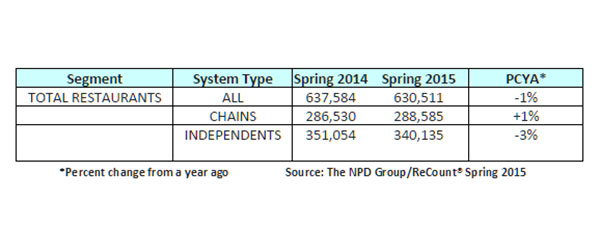 A three percent drop in independent restaurant unit counts compared to year ago brought the total U.S. restaurant count down by one percent to 630,511 units, according to a census of U.S. commercial restaurant locations compiled in the spring and fall each year by The NPD Group, a leading global information company. The total restaurant count decrease was offset by a one percent increase in chain restaurant units. Fast casual chain units increased by 7 percent, based on NPD’s Spring 2015 ReCount®, which includes restaurants open as of March 31, 2015.
A three percent drop in independent restaurant unit counts compared to year ago brought the total U.S. restaurant count down by one percent to 630,511 units, according to a census of U.S. commercial restaurant locations compiled in the spring and fall each year by The NPD Group, a leading global information company. The total restaurant count decrease was offset by a one percent increase in chain restaurant units. Fast casual chain units increased by 7 percent, based on NPD’s Spring 2015 ReCount®, which includes restaurants open as of March 31, 2015.
The drop in independent restaurants was concentrated in the full service segment, which includes casual dining, midscale/family dining, and fine dining. Full service independent units were down 3 percent while quick service independent units remained stable.
The overall decline in restaurant counts is a reflection of the stalled traffic growth experienced by the foodservice industry over the past several years. Independent traffic, quick service hamburger, and full service restaurant visit declines, particularly at midscale/family dining restaurants, are contributing to industry traffic not growing. Visits to total restaurants were flat in the year ending May 2015 compared to same period prior year, according to NPD’s ongoing foodservice market research, CREST®. Over a five year period, traffic has declined by 3 percent at quick service hamburger chain restaurants and at midscale/family dining restaurants (includes hotel midscale restaurants), respectively, and by 2 percent at independent restaurants. Quick service restaurants, which represent 79 percent of total industry traffic, were up 1 percent and casual dining restaurants were flat after several years of decline in the year ending May 2015 period compared to year ago.
“It’s a tough road for independent restaurants particularly in a down or even ‘soft’ economic climate,” said Greg Starzynski, director- product management, NPD Foodservice. “Independent operators do not have the resources of a chain to sustain themselves in slower times.”
posted by Andrea Gonzalez 8/3/15













